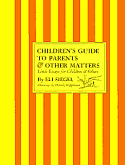 CHILDREN’S GUIDE TO PARENTS
CHILDREN’S GUIDE TO PARENTS
& OTHER MATTERS
Little Essays for Children & Others
By ELI SIEGEL
Chapter 10:
Work
ALL PEOPLE WORK. Work is beginning with something and ending with something that you want and other people may want. A fine instance of work—there are many others—is the chair. You don’t see animals sitting on chairs, unless they’ve first been made by men. When first chairs were made, somebody felt he’d get along better if besides walking, running, and lying on the grass or elsewhere, or sitting on the grass or elsewhere, he’d sit on something between him and the ground.
The earliest people alive—whoever they were—got along without chairs. Chairs were made for people living much later—for example, ourselves. Somebody or some people worked to get to chairs; and have them.
One thing necessary in work is a feeling of what you want. All work is a way of getting what people want. Suppose you started (and you, here, are likely a girl) with some cloth, and you wanted a little bag from the cloth. So looking at the cloth, you’d think of the bag. Then you would take scissors and a needle, or maybe do some measuring; and using scissors and needle and cloth and your hands for some time—all the while knowing you wanted to have a bag—you would, after a while, come to have a bag. You would have worked; you would have known what you wanted; and you would have got what you had in your mind. Maybe you could even give the bag as a present to another little girl. A bag could have been a want of hers, too.
Work is a way of doing as we want to do. I said that all people work. By this I mean that if you see a chair in one end of a room, and you know you have to walk to the end of the room to get to the chair and sit in it, and you do walk to the end of the room, you have been working. You have used your body in order to get something you wanted.
Suppose there was an old lady in a room who was tired, and you, James Nash, knew where a chair was. So you went into the room where the chair was, and brought the chair to where the old lady was. The old lady might smile and say, “Here’s a dime for you, my boy.” So you would be paid for your work; but it would have been work whether you were paid for it or not.
All work, James, has to do with pleasure. Pleasure is what goes with things when you want these things to go on; or, if you like, not to stop. Whether we know it or not, like it or not, we go after pleasure. When a person goes towards a chair to sit down, he thinks he’d like it better being in a chair than standing up. So he takes a little walk in order to feel better than he did. This walk, as I have said, is really work.
All work is for something. If you think the heart in your body is beating for something, it is working. If you even are sleeping in order to do something later, you are working. As soon as anything one does is looked on as being for something, it is work.
Still, work is given a much smaller meaning. People mostly think they work when they go to a factory or office, and stop playing or sleeping or talking; and later get paid by a man in the factory or office. This idea of work isn’t so good. I say this because the chief thing in work is its being useful. Surely, if what people call play is useful, and what they may call work—which they may get paid for—is not useful, then play is more work than “work.”
It is necessary, James, to know what you want and to do things for what you want, before you are working clearly. If people thought more of what gave pleasure or did good or was useful, instead of where things were done and how they were paid for, these people would know better what work is. A baby, as soon as it’s born, is working in order to live. To do anything that is truly good for ourselves or others is work. This will become clearer in other essays.
Copyright © 1971 by Eli Siegel
New Introduction and Drawings © 2003 by Definition Press

